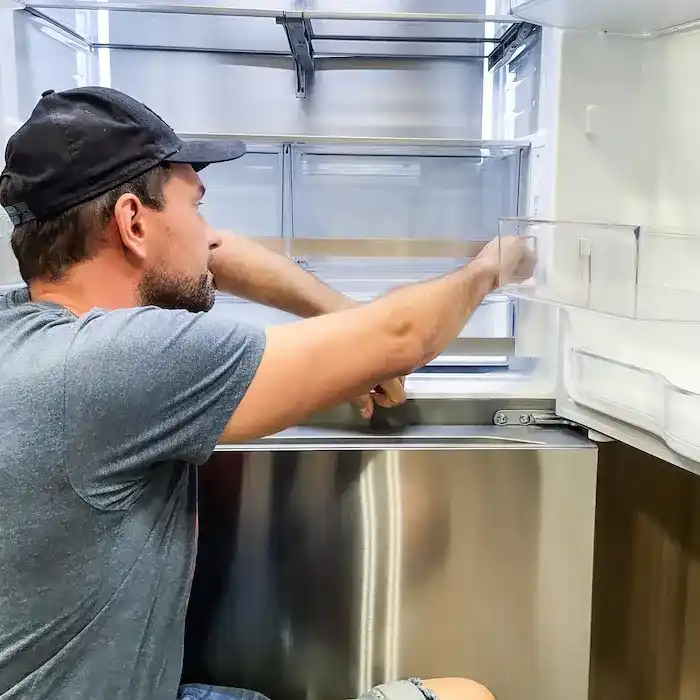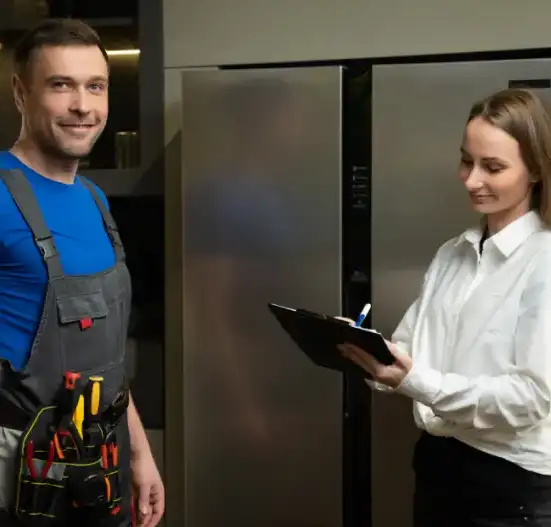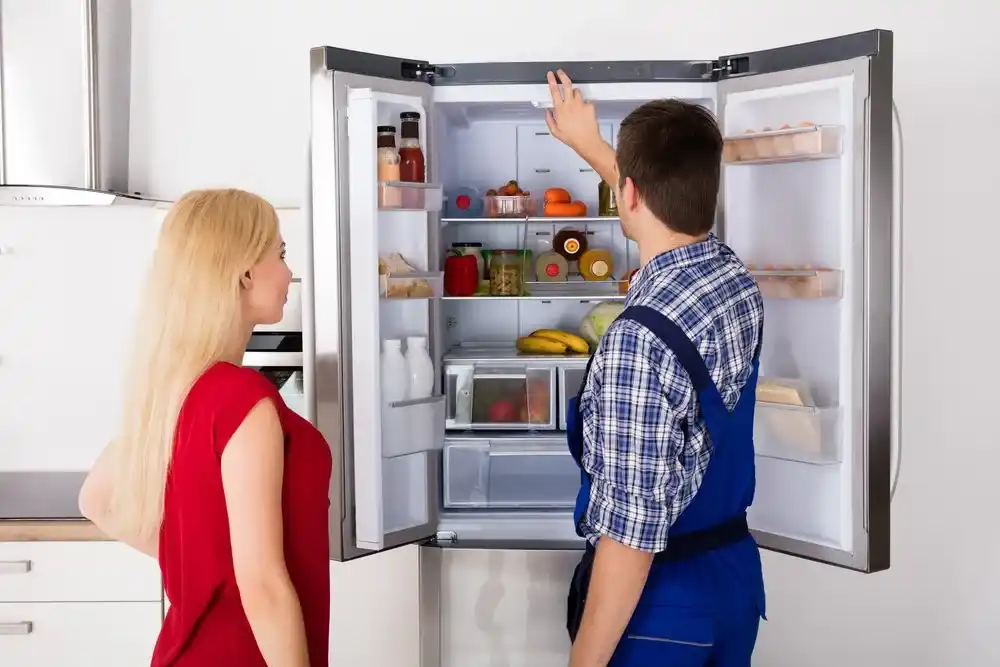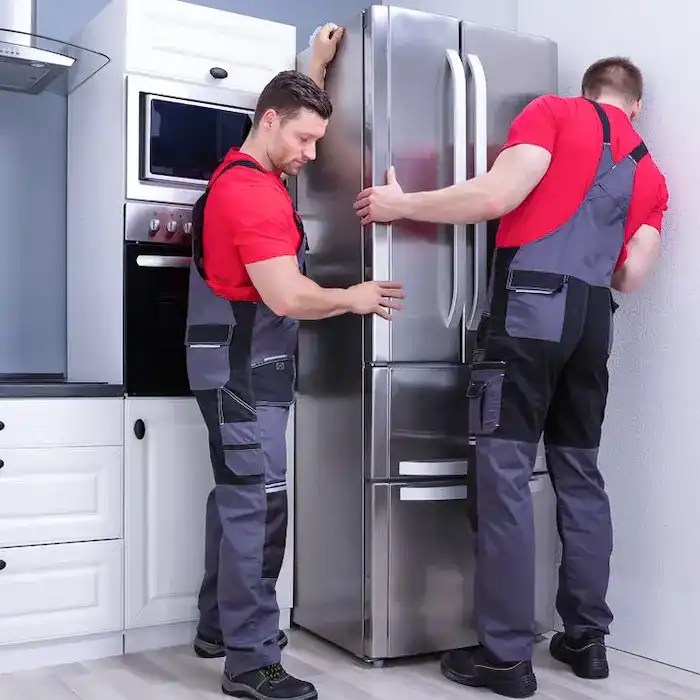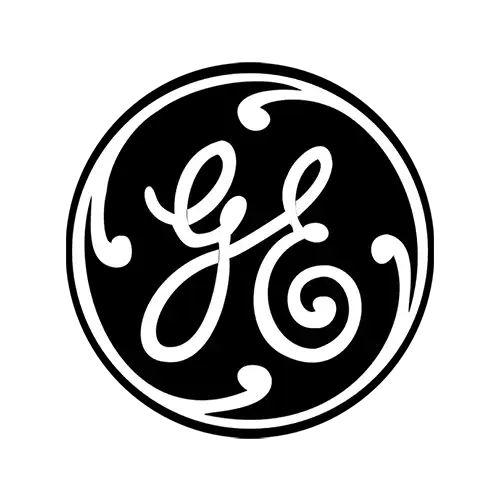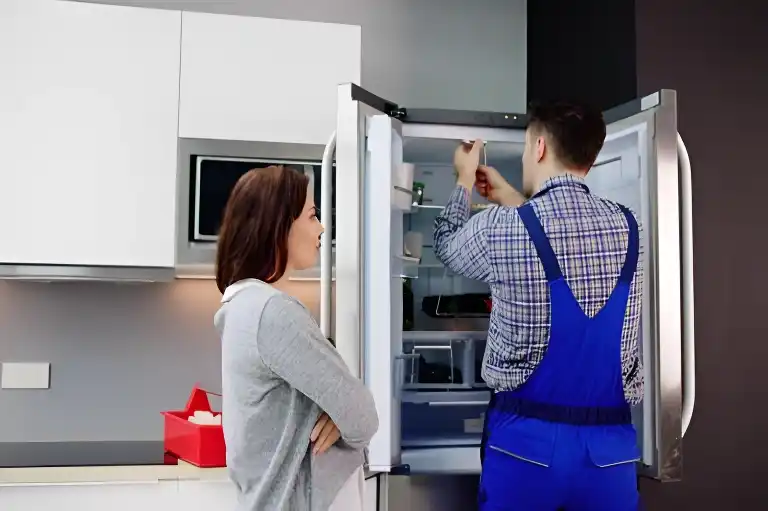FAQs
How Much Does Refrigerator Repair Cost on Average?
︾
︽
The average refrigerator repair cost in Los Angeles is around
$230-$235. However, more complex issues like compressor replacement
can cost $400-$600. The total cost of a refrigerator repair can vary
significantly depending on the specific issue and the brand and model
of the refrigerator.
How Much Does a Mini Fridge Repair Cost?
︾
︽
The cost to repair a compact refrigerator is akin to that of a
standard one, typically ranging from $45 to $120 per hour for labor
plus the expense of parts.
The total repair bill can vary widely, starting from as low as $50 for
minor fixes like a faulty latch or hinge and going up to around $450
for more intricate problems.
Nevertheless, in most cases, replacing a compact refrigerator is more
economically sound than paying for repairs, as the repair expenses can
match those of a brand-new unit.
Common issues with compact refrigerators often revolve around the
compressor, coils, and thermostat, which can incur costs ranging from
$200 to $450 to rectify.
To sum up, the typical cost of repairing a mini fridge falls within
the $50 to $450 range, depending on the specific issue, yet replacing
the unit may be the preferable choice in many instances.
Which Professional Can Help With Refrigerator Repairs?
︾
︽
Refrigerator repairs are typically handled by appliance repair
technicians who specialize in servicing refrigeration units. These
professionals have the expertise and training to diagnose and fix
various issues with refrigerators, such as cooling problems,
malfunctioning components, and electrical issues. It's essential to
choose a reputable and experienced technician to ensure that your
refrigerator is repaired correctly and safely. Many appliance repair
companies offer refrigerator repair services, and you can also find
independent technicians who specialize in refrigeration repairs.
When it comes to choosing a repair company, you can trust the
expertise of our appliance repair technicians. Specializing in
servicing refrigeration units, our professionals are equipped to
diagnose and resolve various issues, from cooling problems to
electrical malfunctions. With our reputable and experienced team, you
can rest assured that your refrigerator will be repaired correctly and
safely. Contact us today for reliable refrigerator repair services you
can count on.
Is it cheaper to repair or replace a refrigerator?
︾
︽
Based on the search results, the key points are:
- It is generally cheaper to repair a refrigerator than replace it,
especially if the fridge is relatively new (less than 10 years old)
and the appliance repair costs are less than half the price of a new
one.
- Factors to consider when deciding to repair or replace include the
age of the fridge, the extent of the damage/issues, energy efficiency,
and cost of repairs vs. replacement.
- For older fridges (over 10-15 years), it may be more cost-effective
in the long run to replace rather than repeatedly repair, especially
if the fridge is inefficient and driving up energy bills.
- Common refrigerator repair costs range from $80-$800 depending on
the issue, while replacement costs can range from $500-$3,000 for a
new fridge.
In summary, fridge repair is generally the cheaper option, especially
for newer models, but replacing an older, inefficient fridge may be
more cost-effective in the long run. The decision should be based on
the specific circumstances and costs involved.
How Much Does It Cost to Fix a Refrigerator Per Type of Repair?
︾
︽
Here is a summary of the typical average costs for different types
of fridge repairs:
Repair Type | Average Cost (Materials and Labor)
Coil | $60 to $100
Compressor | $500 to $1,000
Control board | $500 to $1,000
Drip pan | $50 to $200 (includes labor)
Rubber door seal | $100 to $350
Refrigerant (Freon) leak | $100 to $440
Thermostat | $100 to $400
Door dent | $100 to $700
Ice maker not working | $350 to $500
Inside water leak | $60 to $250
Too cold | $50 to $250
Too warm | $50 to $250
Water leak underneath | $60 to $200
Freezer repair | $100 to $700
Ice maker repair | $200 to $350
Control board replacement | $500 to $800
Thermostat repair | $100 to $300
Coil repair | $100 to $450
Door seal replacement | $100 to $350
Drip pan replacement | $150 to $200
The most expensive repairs tend to be for the compressor, control
board, and refrigerant leaks, which can cost $500 or more. Simpler
repairs like coils, door seals, and thermostats are generally under
$400. The cost also depends on the refrigerator brand, with higher-end
models typically costing more to repair.
How long does a refrigerator last?
︾
︽
Based on the search results, here is a summary of how long
refrigerators typically last:
The average lifespan of a refrigerator is 10-15 years, according to
the U.S. Department of Energy and various appliance experts. However,
the exact lifespan can vary significantly depending on the
refrigerator type, brand, and how well it is maintained
Some key points on refrigerator lifespan:
- Top freezer and bottom freezer refrigerators tend to last the
longest, around 13 years on average.
- Side-by-side refrigerators have a shorter average lifespan of 8-12
years.
- French door refrigerators last around 10-15 years on average.
- Built-in refrigerators are the most durable, lasting 20-25 years on
average.
- Refrigerator lifespan is heavily influenced by the brand and quality
of materials used. Premium brands like Whirlpool and LG tend to last
longer.
- Proper maintenance, such as cleaning the coils and not overloading
the fridge, can help extend the lifespan.
So in summary, while the average refrigerator lasts 10-15 years, the
exact lifespan can range from as little as 8 years for lower-end
models up to 25 years for high-end built-in refrigerators, depending
on the type, brand, and care.
Pros and Cons of Hiring a Professional?
︾
︽
Hiring a professional repair service offers numerous advantages,
especially when considering the risks associated with DIY repairs.
Pros:
1. Expertise: Our trained technicians possess the expertise and
experience to accurately diagnose and efficiently repair appliance
issues.
2. Quality Workmanship: We ensure that repairs are completed to the
highest standard, minimizing the likelihood of recurring problems and
ensuring long-term functionality.
3. Time-saving: By entrusting your appliance repairs to us, you save
valuable time and effort. Our technicians can swiftly identify the
issue and perform the necessary repairs, getting your appliance back
up and running in no time.
4. Warranty: We stand behind our work with warranties, providing you
with peace of mind and protection against future issues.
5. Safety: DIY appliance repair can pose significant safety hazards,
especially when dealing with complex appliances. Our professionals
have the knowledge and tools to perform repairs safely, minimizing the
risk of accidents or injuries.
Cons:
1. Cost: While professional repair services may involve initial costs,
they ultimately offer greater value by ensuring quality repairs and
preventing further damage.
2. Waiting Time: Scheduling an appointment with our repair service
ensures prompt attention to your appliance issues, minimizing waiting
times and inconvenience.
3. Lack of Control: By choosing our professional service, you benefit
from our expertise and judgment, ensuring the best possible outcome
for your appliance.
4. Potential for Overcharging: With our transparent pricing and
commitment to customer satisfaction, you can trust that you'll receive
fair and competitive pricing for parts and services.
5. Limited Availability: Our reputable repair service is committed to
serving our customers promptly and efficiently, ensuring that your
appliance issues are addressed in a timely manner.
In summary, entrusting your appliance to our professional service not
only saves you time and effort but also ensures the safety and
longevity of your appliances. Avoid the risks and uncertainties of DIY
repairs and rely on our expert technicians for all your appliance
repair needs.
How can you save money on refrigerator repair?
︾
︽
To save money on refrigerator repair, consider the following tips:
- Regular Maintenance:Schedule regular maintenance for your
refrigerator to identify and address minor issues before they escalate
into costly repairs.
- DIY Troubleshooting:Learn basic troubleshooting techniques
to diagnose simple problems yourself, such as checking for blocked
vents, dirty condenser coils, or faulty gaskets.
- Prompt Attention:Address any issues promptly to prevent them
from worsening over time. Ignoring small problems can lead to more
extensive and costly repairs down the line.
- Comparison Shopping:Obtain multiple quotes from reputable
appliance repair services to compare prices and ensure you're getting
the best value for your money.
- Consider Warranty Coverage:When possible, consider using
refurbished parts instead of brand new ones. Refurbished parts are
often more affordable and can be just as effective.
- Opt for Refurbished Parts:Consider whether your current oven
meets your cooking needs and preferences. If you desire modern
features, improved performance, or enhanced convenience that your
existing oven lacks, upgrading to a new model may offer greater
satisfaction and utility.
- Preventive Measures:Take preventive measures to extend the
lifespan of your refrigerator, such as keeping it clean, maintaining
proper temperature settings, and avoiding overloading it with food.
- DIY Repairs:While some repairs are best left to
professionals, minor repairs that require simple adjustments or part
replacements can often be done yourself, saving you money on labor
costs.
- Energy Efficiency:Ensure your refrigerator operates
efficiently by keeping the seals tight, defrosting regularly, and
maintaining proper temperature settings. A well-maintained
refrigerator consumes less energy, resulting in lower utility bills
and reduced appliance repair costs.
- Long-Term Planning: If your refrigerator requires frequent repairs
and is nearing the end of its lifespan, consider investing in a new, more
energy-efficient model. While the upfront cost may be higher, you'll save
money in the long run on repairs and energy bills.
Which Home appliances need the most repairs?
︾
︽
The appliances that typically require the most repairs include:
- Refrigerator: Refrigerators are essential appliances that run
continuously, making them prone to wear and tear over time. Common issues
include compressor failures, thermostat problems, and issues with ice makers
or water dispensers.
- Washing Machine:These undergo frequent use and washing
machine repair can be needed for leaks, drainage problems, faulty
motors, or malfunctioning control boards.
- Dishwasher:Dishwashers are subjected to high temperatures
and water pressure, leading to such frequent dishwasher problems like
clogged drains, malfunctioning pumps, or issues with the electronic
control panel.
- Dryers:Dryer repair involve heating elements, drum rollers,
belts, or faulty sensors, leading to ineffective drying or potential
safety hazards.
- Ovens and Stoves:Ovens and stoves may require repairs due to
problems with heating elements, igniters, thermostats, or control
boards. Issues with gas appliances, such as leaks or faulty safety
valves, can also necessitate repairs.
- Microwaves:While relatively simple appliances, microwave
repair might be necessary for issues with door switches, magnetron
tubes, or electronic control panels, requiring professional repairs.
- HVAC Systems:Heating, ventilation, and air conditioning
(HVAC) systems can experience various problems, including compressor
failures, refrigerant leaks, thermostat issues, or malfunctioning
fans.
- Garbage Disposal:Your Garbage disposal can become clogged or
jammed due to food debris, leading to motor burnout or damage to
internal components. Garbage disposal repair is essential, as while
simple issues like jamming are cheap to repair, larger problems may
warrant complete replacement.
- Water Heaters:Water heaters may require repairs for issues
such as sediment buildup, heating element failures, leaks, or
malfunctioning temperature and pressure relief valves.
- Freezers:Freezers can experience problems like compressor
failures, temperature fluctuations, frost buildup, or issues with door
seals, resulting in reduced efficiency or food spoilage.
While these appliances are more prone to repairs, proper maintenance
and timely attention to any issues can help minimize the need for
costly repairs and prolong their lifespan. Regular maintenance, such
as cleaning, lubricating moving parts, and checking for signs of wear,
can help prevent problems before they arise.
Repair the Appliance Yourself?
︾
︽
Repairing appliances yourself can be tempting, especially if you're
handy or looking to save money. However, there are several factors to
consider before attempting a DIY repair:
- Safety Concerns:Many home appliances involve electricity,
gas, or moving parts, which can pose safety risks if mishandled.
Without proper knowledge and precautions, DIY repairs can lead to
electrical shocks, gas leaks, or injuries from moving components.
- Complexity of Repairs:Modern appliances are increasingly
complex, with intricate electronic components and advanced
technologies. Repairing them often requires specialized tools,
diagnostic equipment, and technical expertise that may be beyond the
average homeowner's capabilities.
- Risk of Further Damage: Attempting DIY repairs without the necessary
skills or knowledge can worsen the problem or cause additional damage to
the appliance. This can result in more extensive repairs or even the need
for a costly replacement.
- Warranty Considerations:Many appliances come with
manufacturer warranties that may become void if repairs are attempted
by unauthorized individuals. DIY repairs could jeopardize your
warranty coverage, leaving you responsible for any future repairs or
replacements.
- Time and Effort: DIY repairs can be time-consuming and frustrating,
especially if you encounter unexpected challenges or lack the necessary
expertise. In contrast, hiring a professional technician for appliance
repair can save you time and ensure the job is done correctly the first
time.
While DIY repairs may seem like a cost-effective solution, it's
essential to weigh the risks and benefits carefully. In many cases,
hiring an appliance repair service not only ensures safety and quality
but also provides peace of mind knowing that your appliance is in
capable hands.
DIY vs. Professional Appliance Repair?
︾
︽
When it comes to appliance repair, homeowners often face the choice
between tackling the job themselves or hiring a professional. Here are
some key factors to consider when deciding between a DIY approach and
professional appliance repair:
DIY Appliance Repair:
- Cost Savings: One of the primary reasons homeowners opt for DIY
repairs is to save money on labor costs. With DIY, you only need to
purchase the necessary parts, which can be more affordable than paying
for professional services.
- Convenience: DIY repairs offer the convenience of being able to
address the issue on your own schedule without having to wait for a
technician to arrive. You can also avoid the hassle of scheduling
appointments and coordinating with repair companies.
- Learning Opportunity: For those who enjoy hands-on projects and have
some technical skills, DIY appliance repair can be a valuable learning
experience. It allows you to gain a better understanding of how your
appliances work and how to troubleshoot common issues.
Professional Appliance Repair:
In many cases it is worth repairing your appliance using professional
appliance repair appliances to keep them in a tip top shape. Each
repair technician in our company is an experts in refrigerator repairs
and many other appliances including luxury and expensive appliances.
- Expertise and Experience: a Professional appliance repair specialist
has the training, experience, and specialized tools necessary to
diagnose and fix a wide range of appliance problems quickly and
effectively. Their expertise can ensure that the repair is done
correctly the first time, minimizing the risk of further issues.
- Safety: Appliances can pose safety risks, especially when dealing
with electricity, gas, or complex mechanical components. Professional
technicians are trained to handle these risks safely, reducing the
likelihood of accidents or injuries during the repair process.
- Warranty Protection: Hiring an appliance repair service may help
preserve your appliance's warranty coverage. Many manufacturers
require repairs to be performed by authorized technicians to maintain
warranty eligibility. DIY repairs could void the warranty, leaving you
responsible for any future issues.
- Time and Convenience: While DIY repairs may seem convenient at
first, they can be time-consuming and frustrating, especially if you
encounter unexpected challenges or lack the necessary expertise.
Professional technicians can efficiently diagnose and repair the
problem, saving you time and hassle in the long run.
Ultimately, the decision between DIY and professional repair depends
on factors such as your level of skill and experience, the complexity
of the repair, and your willingness to invest time and effort into the
project. While DIY repairs may be suitable for minor issues or
experienced DIY enthusiasts, complex problems or safety concerns are
best left to an appliance repair specialist.
Will a home warranty cover appliance repair costs?
︾
︽
A home warranty will generally cover the repair costs for major home
appliances due to normal wear and tear, regardless of the age of the
appliances. The key points are:
- Home warranties cover the repair and replacement costs for common
home appliances like refrigerators, ovens, dishwashers, washing
machines, etc.
- Coverage typically includes the mechanical parts, motors, switches,
and other components that fail from regular daily use.
- Home warranties will not cover damage from accidents, misuse,
improper installation, natural disasters, or other non-normal wear and
tear issues.
- There is usually a 30-day waiting period before you can file a claim
on a new home warranty plan.
- Home warranties have coverage limits, such as a maximum dollar
amount per repair or replacement.
- The home warranty company will send a pre-approved contractor to
diagnose and repair the appliance.
So in summary, yes a home warranty will generally cover the repair
costs for major home appliances that break down due to normal use,
subject to the specific terms and limitations of the warranty plan.
What are typical costs associated with refrigerator repair, and how
do these compare to the costs of fixing other Home appliances like
dishwashers and freezers?
︾
︽
Fridge repair costs can vary widely depending on the nature of the
issue. Common problems include broken motors, faulty thermal fuses, or
malfunctioning door springs which may cause the fridge to fail at
keeping food cold. The average price for refrigerator repairs can be
influenced by the hourly rate of the repair person and the cost of any
broken parts that need replacement. Similarly, freezer repair cost
might be on par with fridge repair cost, especially if they involve
critical components like the pilot light or thermal units.
In comparison, dishwasher repair costs might be lower unless there are
major issues like a broken motor. A typical service call for electric
appliances like dishwashers generally includes an assessment and minor
repairs such as replacing light bulbs or door springs, which are less
intensive than cooling system repairs. When considering whether it's
cost-effective to repair or replace, it's important to consider the
age of the appliance, the cost of new parts, and the remaining
duration of the manufacturer's warranty. If the cost of repairs
approaches or exceeds 50% of the price of a new appliance, it may be
more economical to invest in a new refrigerator.
When should I opt for a repair of my existing refrigerator over
purchasing a new one, and how can I ensure the repair is done
effectively?
︾
︽
Deciding whether to repair your existing refrigerator or purchase a
new one depends on several factors. First, consider the appliance
coverage under the manufacturer's warranty— if your refrigerator is
still under warranty, repairs might be covered, which can
significantly reduce costs. Evaluate the extent of damage; if your
refrigerator has a broken motor or major system failures, the repair
costs might be high, making a new refrigerator a more appealing
option.
However, if the repairs are manageable—such as replacing a pilot light
or thermal fuses—then it is usually more cost-effective to repair,
especially if the refrigerator is relatively new and otherwise in good
condition. Always ensure that repairs are done by a qualified repair
person who is experienced with electric appliances. Opting for
services like same-day appliance repair can ensure that your
refrigerator is fixed quickly and efficiently, minimizing disruption
and keeping your food cold without delay.
